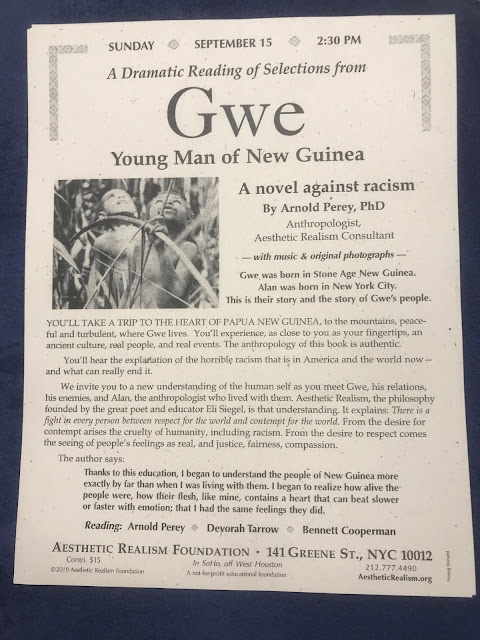"The Aesthetic Realism Teaching Method: Students Learn, Prejudice Is Defeated!'
 |
| Seminar Participants |
Aesthetic Realism is the greatest opponent of injustice I know. (That is why a few selfish people are angry and lie about it). It explains we have two opposing drives all the time, one towards respect & seeing meaning, the other for contempt. Eli Siegel, the great poet, critic & educator who founded Aesthetic Realism, identified contempt as the addition to self by the lessening of other things. It is the root cause of racism and war. The study of respect & contempt is an emergency.
 |
| Seminar Participants |
 |
| Mountains & Rainbow, by Arnold Perey |
You'll take a trip to the heart of Papua New Guinea, to the mountains, peaceful and turbulent, where Gwe lives. You'll experience, as close to you as your fingertips, an ancient culture, real people, and real events. The anthropology of this book is authentic.
You'll hear the explanation of the horrible racism that is in America and the world now -- and what can really end it.
 |
| Flyer for Gwe |
e·go·tism/ˈēɡəˌtizəm/The reason I'm writing about this is that though the seminar was about how men need to think about women, I felt it was a guide as to how people need to see people, as such, and that takes in ethnicity.
noun- the practice of talking and thinking about oneself excessively because of an undue sense of self-importance.
"in his arrogance and egotism, he underestimated Jill"
 |
| Morecambe head teacher Siobhan Collingwood |
As soon as you have contempt, as soon as you don't want to see another person as having the fulness that you have, you can rob that person, hurt that person, kill that person. (James and the Children, p 55)Contempt is ordinary. It's in a conversation when you fail to listen. It's behind every sneering look and every petulant outburst. And it makes a person cruel. Other people are cardboard cutouts and we are deep and sensitive. Contempt is easy to see in other people but it takes courage and real thought to see it in oneself. Meanwhile, looking at contempt in oneself is a personal and national emergency. When we have contempt we sunder our relation to the world that, according to Aesthetic Realism, we were born to like, to be moved by, excited by, even saddened by. We're born to have it do something to us, not to be stony replicas of sentient beings!